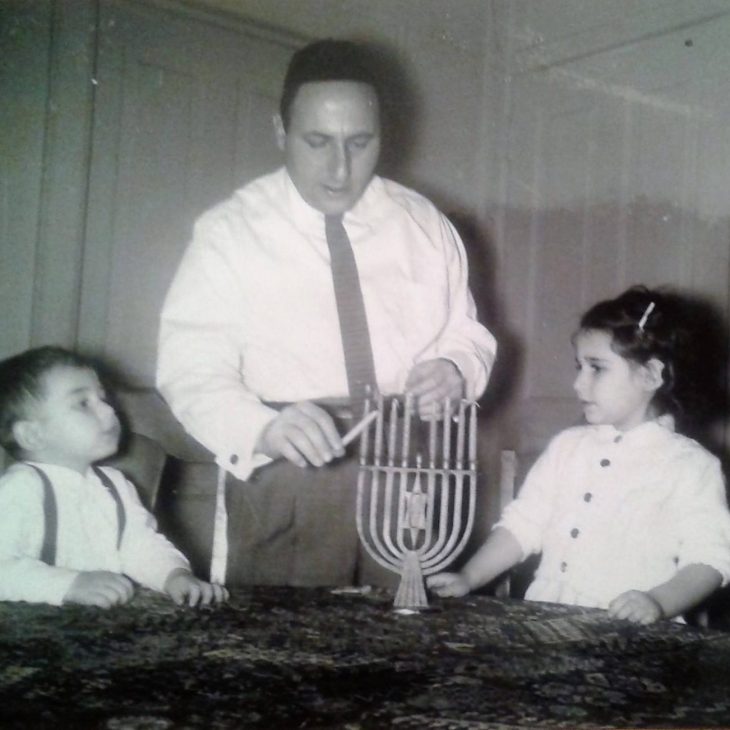The Maccabees and Me: How I Learned to Love Hanukkah
December 22, 2022

Hanukkah, in a way, was one of my first words. The Jewish festival of lights began at the start of December of 1991, and my parents lovingly explained everything they were doing to light the candles. I was delighted. My mother remembers that she put the Hanukkiah, the lamp (often referred to as a menorah) that we use at Hanukkah time, up on the mantle, so that my toddler hands wouldn’t catch on fire. I pointed to it, said “Hakkah,” and then associated all other lights with it for a while, particularly candles. This was an anecdote so beloved by my family that is repeated every year, usually after we have lit the candles together for the first night.
I didn’t know it yet at 20 months old, but thus began my lifelong obsession with Hanukkah. It’s a holiday that, as an adult, I have mixed feelings about: It celebrates light in the darkness, hope where there is none, and the triumph of the underdog; at the same time, it celebrates war, bloodshed, and the winning of fundamentalism over modernism. Things were a lot easier when I only associated “Hakkah” with my family and candles. Nonetheless, my interest in the holiday remains.
Hanukkah celebrates the winning of the Jewish people over the Greek Seleucid empire in the 2nd century BCE, but it also celebrates the major underdog story of the Maccabean revolt. The Maccabees were fundamentalist Jews who hated the Hellenistic influence of the Greek empire on Jewish life. In the end, the Maccabees declared independence, but the battle to get there was long, hard, and had a deep effect on the way Judaism was practiced then and now.
Originally, the Greeks hadn’t had any problems with how the Jews practiced their religion, such as sacrificing in the Second Temple in Jerusalem and running their own Jewish affairs. Upper-class and some city-dwelling Jews began to Hellenize, becoming more like the other vassal states of the empire: They began no longer following strict kosher rules, not circumcising their male children, and sometimes sacrificing to the Greek gods in Greek temples. The Maccabees, on the other hand, a majority of whom lived outside the cities of Israel and were fundamentalists where religion was concerned, continued to practice the way they believed Jews had been doing for centuries. However, after a high priest of Jerusalem led a revolt, the Greeks seemed to have assumed it was all of Judaism that was problem and cracked down on open Jewish worship from that point out. The Maccabees, who had always hated the Greek rule, revolted not only against them, but also the Hellenized Jews, and everything they stood for: a Judaism that made room for assimilation.
The Maccabees ended up winning that revolt, and the story we’ve all heard about the origins of Hanukkah, the miracle of the eight nights that the oil lasted, is their story. The way that they practiced Judaism won out over the Hellenized, assimilated version. This means that the Judaism we practice now has been highly influenced over the years by this example of an intra-religious dialogue — what does it mean to be a Jew? How does a Jew practice? These are queries that are not only still being asked to this day but are the central questions of 21st century Judaism.
As a Reform Jew, the daughter of a Jewish mother and a father who did not convert to Judaism until after I was born, I am exactly the kind of person by which the Maccabees would have been horrified about living in their ranks. I do not keep Kosher. I mix different cloth materials in my clothes. I care very deeply about Judaism, learning, Torah, and my people’s history, but am an educated and literate woman who works outside the home, firmly into my 30s without children. I don’t think they would have any idea what to do with me. Personally, the sort of Judaism I participate in is closer to the Seleucid Greek Judaism than the Maccabean Judaism. Does this holiday celebrating the Maccabees’ victory hold meaning for me?
I believe it does, albeit perhaps not in the way the Maccabees intended. Hanukkah is a time to spend time with other Jews in a season where much of North America seems entirely focused on Christmas, which has become very secularized despite its Christian roots. Although Hanukkah is not a major festival and did not even originally involve giving each other gifts outside of its context as the Jewish holiday closest to the Christmas season, it has become larger in American Jewish life due to its ability to hold Jewish space in the holiday season. It is a time of year where I am completely happy to say, “Actually, I celebrate Hanukkah,” and spend the time with my loving family. Although I am an assimilated Jew, I nonetheless strongly identify as a Jew even though there is a larger culture of a different religion, and in that way, I am more like the Maccabees than not. I will continue to light “Hakkah” candles with my family and celebrate their warmth and love every year, and I believe that it will reinforce my Jewish identity in the years to come.
Share
Related Articles
American Civic Life
Interfaith Inspiration
What Religious Holidays are Happening in November and December?
American Civic Life



